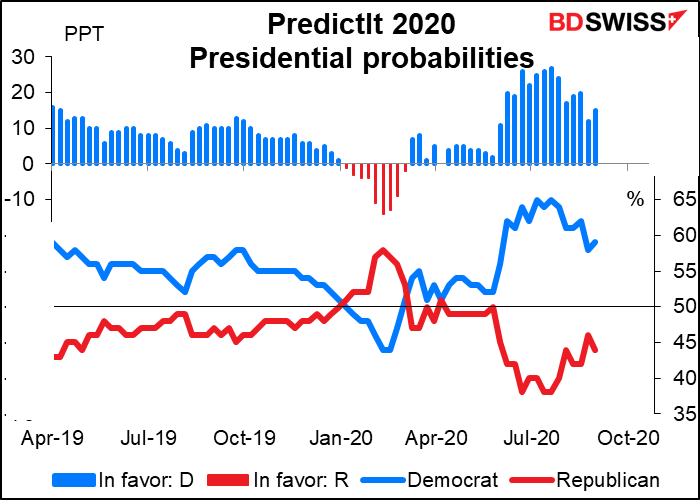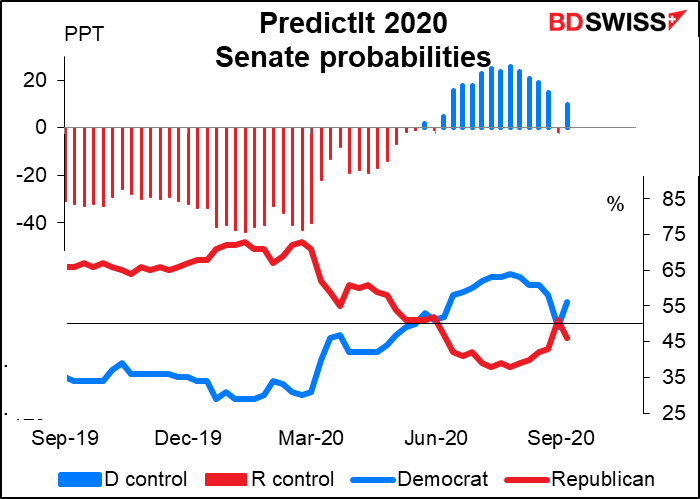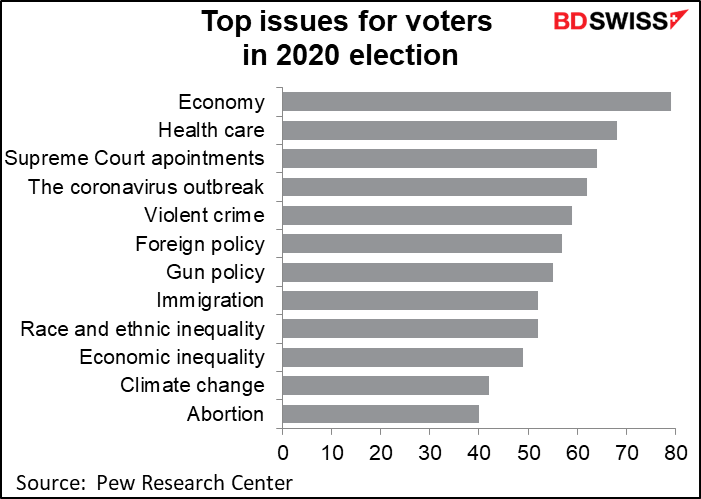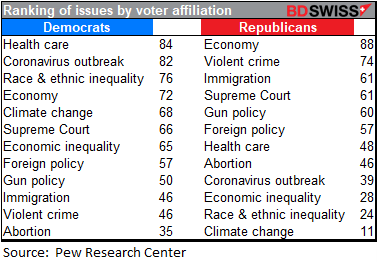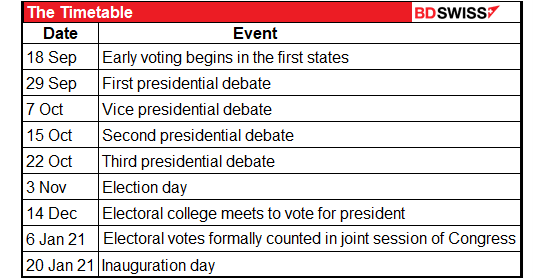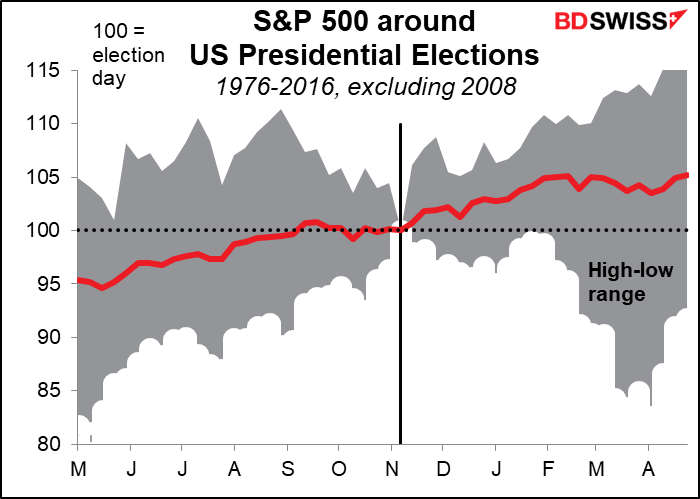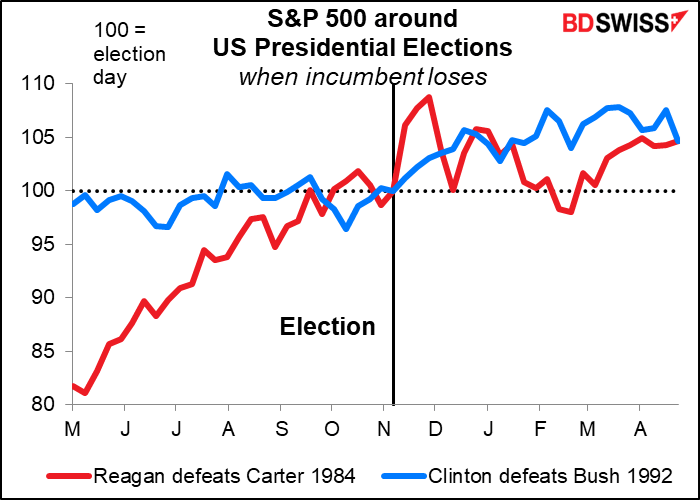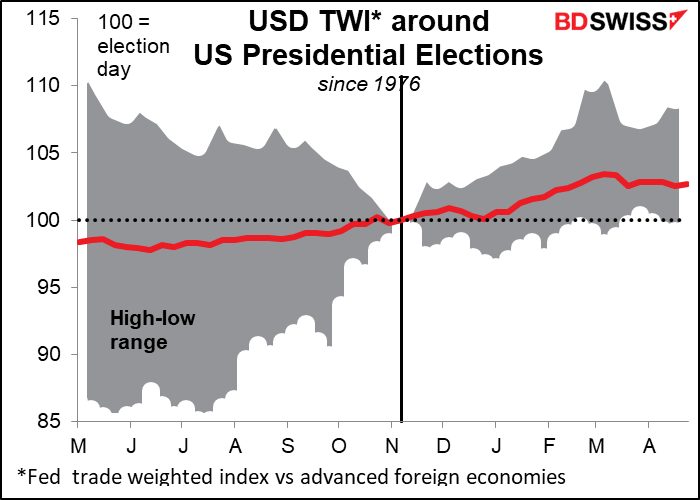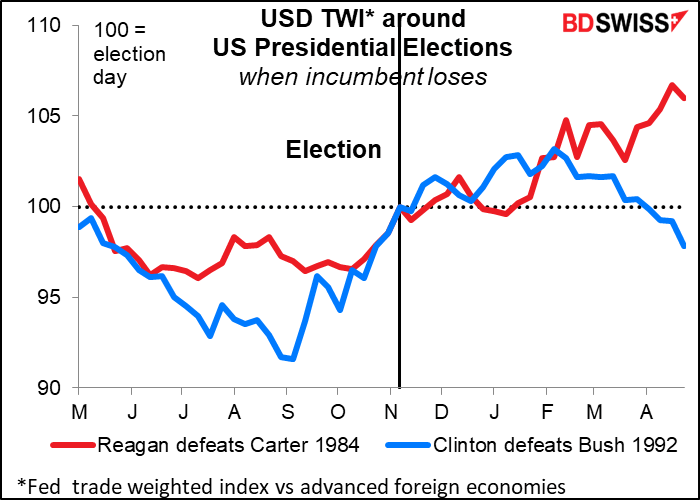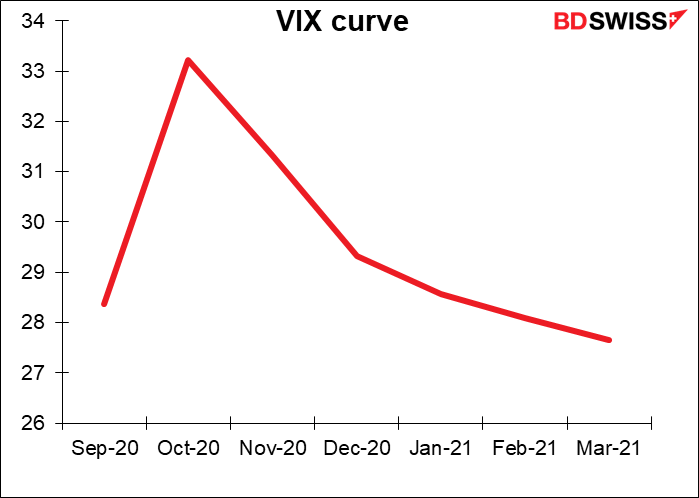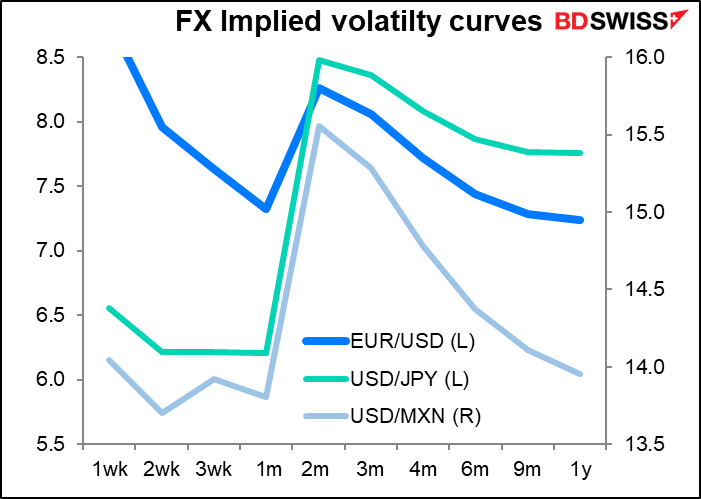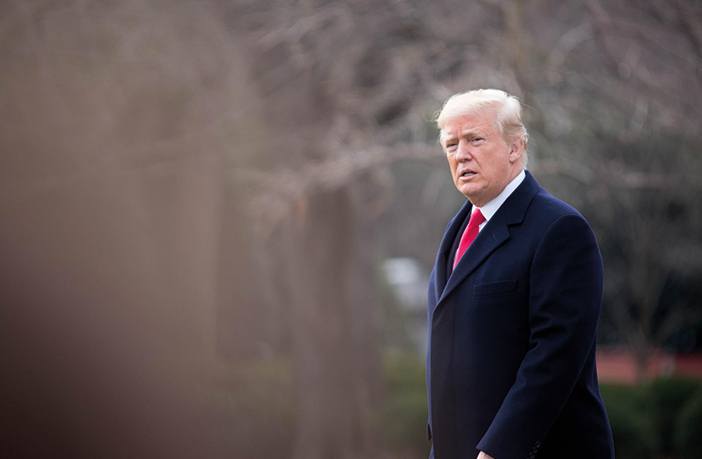
As the US elections on 3 November approach, I’d like to take a look what’s at stake, what the likely outcomes are, and how the markets might react. I would also like to discuss some of the unheard-of risks that this election represents, risks that few people have considered for any major industrial country in decades. A Trump victory represents a danger to the markets, but a narrow Trump loss could be an even more serious danger – for totally different reasons.
(For those who are unfamiliar with the organization of the US government or the crazy way that the President is elected, please see the boxes at the bottom.)
What’s at stake
The focus is on the Presidency of course, with the incumbent Trump running against former Vice President Joe Biden. Currently, Biden is the favorite to win, but all of his supporters (including me) are acutely aware that Hillary Clinton was the favorite to win back in 2016, too.
There are a number of reasons why people don’t think 2020 will be a repeat of 2016, especially 1) fewer undecided voters who might choose at the last minute to give Trump a chance, and 2) the absence of third-party candidates to siphon votes away from Biden. In 2016 there were a lot of people who didn’t like either candidate and so voted for someone else. This enabled Trump to win six states with less than a majority. But people don’t have the same antipathy to Biden that they did to Clinton. If Trump can’t improve his polling and those voters vote Democratic this time, he’ll lose those states.
Also, pollsters learned the lessons of 2016 and have adjusted their polling methods, particularly increasing their polling of non-college-educated voters, who were the big surprise group voting for Trump.
Nonetheless, we can’t be sure until 20 January 2021.
At the same time, all 435 seats in the House of Representatives are up for election, as are 35 of the 100 seats in the Senate.
There’s not much question about the House of Representatives. Currently the Democrats have a majority, 232 to 198. They are expected to keep control. The Cook Political Report estimates that the Democrats will maintain their strength or increase their majority by up to 10 seats. This seems to be the consensus.
The Senate on the other hand is a toss-up. With 35 seats up for grabs, the Democrats need a net gain of three in case Biden wins (because the Vice President votes in case of a tie) and four if he doesn’t. The Cook Report predicts that they will gain between two and six seats – maybe enough to win control, maybe not. The Princeton Election Consortium and ElectoralVote both predict 51 seats for the Democrats – just squeaking by. That’s why so much money is being poured into the Senate races this year – a marginal win of a few seats could tip control of the entire institution.
The issues: depends on whom you ask
There are significant differences in the issues that voters are concerned about depending on their political affiliation. The economy comes high for both Republicans and Democrats, but the coronavirus outbreak is bizarrely low for Republicans – reflecting Trump’s success in convincing his followers that it’s just “fake news” and a “Democratic hoax,” even though we know now from Bob Woodward’s new book that Trump knew from the start that it was a deadly pandemic. Views on climate change and abortion vary significantly by affiliation as well.
Trump: The election is largely a referendum on Trump, his personality and his record, in my view. You may find it hard to believe that there are different views on this subject in the US, but there are. (Similarly, only 60% of the US population “believes” in the theory of evolution and 25% think the sun revolves around the earth.)
COVID-19: The virus has become a major political issue. Many people are aghast at the Trump regime’s mishandling of the pandemic and have realized he’s just not up to the job of being President. Others still believe the virus is just “fake news” invented to discredit Trump.
The senior vote (over-65) was Trump’s best age demographic in 2016; he won this group by 8 percentage points. But these voters have been hard-hit by the virus and did not appreciate Trump’s disregard for their safety. He’s now trailing by 12 ppt in this crucial demographic. That’s important because a lot of Americans retire to Florida, one of the states hardest-hit by the virus. It’s difficult if not impossible for Trump to win the election without winning Florida’s 29 electoral votes. Similar with Arizona, another big retirement state.
You may have noticed a lot of news about a possible vaccine coming out around 1 Nov, a few days before the election. This is no doubt a ploy to convince people that Trump is going to save them while encouraging them to forget how the country got into this mess in the first place.
Jobs: There are some 13.5mn people officially listed as unemployed, but 29.2mn receiving unemployment benefits. This compares with 7.5mn unemployed persons and 2.6mn people claiming benefits when Trump came into office. Several of the traditional swing states – Michigan, Wisconsin, and Pennsylvania – have been particularly hard-hit by job losses. Congress has been unable to agree on renewing the federal aid to unemployed persons. A lot of the battle will be pinning the blame for that disagreement on the other side. If people were voting according to Ronald Reagan’s famous question – are you better off than you were four years ago? – there would be no question who’d win.
Racism/Civil unrest: I put these two items together because they are two sides of the same coin. Which side you see depends on which side you belong on. There have been widespread demonstrations in the US led by the “Black Lives Matter” (BLM) movement in protest at police killings of unarmed Black people. A few of these protests have degenerated into violence and looting. A slim majority (52%) of Americans approve of the BLM movement and feel the protests are justified.
Trump on the other hand is trying to turn the issue to his advantage by running as the law-and-order candidate, arguing that the country will dissolve into chaos under Biden. Odd he should say that, since these riots are taking place under his watch. That fact hasn’t escaped the voters; more voters trust Biden to handle public safety than Trump, 47% to 39%. Biden also wins on race relations by a 19-point margin.
Note in the table of ranking of issues by voter affiliation, Democrats and Republicans had almost mirror image rankings of inequality and crime. Democrats ranked racial and ethnic inequality high (#3) and violent crime low (#2 from bottom), while Republicans ranked violent crime #2 and inequality was their #2 from the bottom.
Positions
Trump: When interviewed by one of his favorite Fox News “reporters,” Trump himself was incapable of saying what his second-term agenda would be. Yet the Republican Party didn’t even bother putting forward a platform for the election. They’re just running on Trump.
I assume his main focus in a second term would be continuing with his “America First” program, especially with regards to China. He recently discussed “decoupling” the US economy from China, including blocking companies that offshore jobs to China from getting federal contracts. He’s likely to withdraw from the W orld Trade Organization and continue to impose tariffs.
Continued emphasis on developing fossil fuels and rolling back environmental protection.
As for fiscal policy, tax cuts might be difficult given the enormous budget deficit, but he will probably try to cut the payroll tax – which of course does nothing for people who aren’t on a payroll.
Biden: Biden is not the violent socialist revolutionary that Trump et. al. are trying to make him out to be. He’s a middle-of-the-road kind of guy. His nomination plus his selection of Kamala Harris as VP represent a solid rejection of the most left-wing impulses of his party.
International relations: Democrats have traditionally been less in favor of free trade than Republicans, at least until Clinton was elected. Biden can be expected to return to that tradition with regards to China and continue to get tough on China with regards to trade, technology and intellectual property. The difference is that he would try to do it with US allies. The flip side of that would probably be better relations with European countries, especially as he would encourage European tech companies to replace Chinese partners with US or domestic ones.
He would return to the WHO and would not withdraw from the WTO. He would probably rejoin the Paris Climate Accord.
Tariffs: he might remove some tariffs on China and probably all of the tariffs on US allies such as Canada.
US labor issues: Biden wants to promote unionized labor and raise the minimum wage.
Social policy: He has a plan to increase childcare and care for the elderly. Universal pre-school for 3- and 4-year-olds.
Industrial policy: He wants to invest $2tn in clean energy and use infrastructure investment to get America back to work. He’s also likely to pursue an active anti-trust policy, not just against the tech industry bus also food, health care, and other concentrated industries.
Taxes: He wants to reverse the 2017 tax cuts, raise the corporate tax rate and raise the capital gains tax to the marginal income tax rate.
Possible results
There are four possible results, ranked in order of what I think is most likely to least likely:
-
The Democrats win everything. A “blue wave” gives the Democrats control over both houses of Congress and the White House.
-
Two out of Three: Democrats win the House of Representatives and the White House, but Republicans maintain control of the Senate.
-
Status quo: Democrats retain control over the House, but Trump wins re-election and the Senate remains Republican.
-
Democratic Congress, Republican presidency: Democrats take control over both houses of Congress but Trump somehow wins the presidency. I consider this result unlikely, because I think if there are enough Republican voters to elect Trump, there will probably be enough Republican voters to vote in a Republican Senate
Scenario #1: The Democrats raise taxes on companies and wealthier taxpayers while increasing spending on infrastructure, health and education. Increased regulation of tech companies, energy and financial services likely. Hike in the minimum wage.
Rapid action on health care is likely to reinstate many of the provisions of Obamacare that the Republicans dismantled. This is a key issue for Democrats.
Relations with Europe, Canada and Mexico improve, but pressure on China remains.
More balanced growth should emerge eventually as employment rises, antitrust enforcement increases competition, and inequality is reduced. The budget deficit would probably narrow over time as taxes on high earners rise.
Scenario #2: Similar to above, but some issues, such as health care and the minimum wage, might be difficult to pass. This could be the best result from a fiscal point of view as the Republicans restrain spending plans, although they might also restrain tax hikes as well.
Scenario #3: This is a continuation of the situation that we have now, which we know is a disaster. There might be some room for Congress to compromise on infrastructure spending and aid to the unemployed, but major policy changes would be blocked. With Congress immobilized, Trump would focus on the international arena, where he has more room to maneuver. That means more pressure on China, possibly degenerating into military confrontation in the South China Sea.
One key threat under this scenario: Fed Chair Powell’s term is up in February 2022. Trump would probably try to replace him with a more sympathetic, or one might say compliant, person. (This could raise an interesting point: the President appoints the Chair of the Board of Governors of the Federal Reserve. But the rate-setting Federal Open Market Committee (FOMC) elects its own chair. Up to now that’s invariably been the Chair of the Board of Governors, but there’s no law that says it has to be that way.)
At least one Supreme Court justice is not likely to make it another four years. If a Republican President can select the next justice and have a Republican Senate confirm him or her, it would cement the right-wing majority on the Supreme Court. That would have a long-lasting impact on the US, as Supreme Court justices serve for life.
Scenario #4: As I said, this is pretty unlikely. If it did happen, Congress would send bills to Trump and he would veto them. To override a presidential veto requires a two-thirds majority in both chambers. It would probably be impossible to get that in the Senate.
However, I expect that if the Democrats control both chambers and Trump is president, it’s only a matter of time before they impeach him again and kick him out. In that case, Pence becomes president and who knows what happens then?
Implications for the markets: probably good
Usually, the way we assess what might happen in the markets is by looking at what happened under similar circumstances in the past. This time however the past may not be a good guide to the future, because the current circumstances are unique, starting with the incumbent.
Wall Street tends to be pro-Republican, but not this time. According to The Economist newspaper, “Total donations (from large Wall Street donors) went mostly to Republicans in 2016, but are now evenly split….Strikingly, many appear to be sitting 2020 out; around a fifth of those who gave meaningfully in the last election have given nothing in 2020.This decrease is largely the result of a drop in contributions to the presidential campaign, particularly that of Donald Trump.”
According to the Center for Responsive Politics, Biden has raised almost twice as much from the finance, insurance and real estate industries as Trump has ($76.8mn vs $43.0mn), while overall giving from that sector has gone 72% to Democrats and 28% to Republicans. In the previous presidential election it was 36% to Democrats and 64% to Republicans.
There are two reasons. On the one hand, many people on Wall Street are tired of “government by Twitter” and the unpredictability of the Trump regime. For example, it hasn’t escaped anyone’s attention that many of Trump’s more optimistic tweets come out shortly before the stock market opens.
At the same time, Biden has for decades been the senator from Delaware, home to many financial and credit card companies (and one of the world’s last remaining offshore tax havens, but never mind). Until becoming VP his largest single contributor over the years was credit card giant MBNA Corp. Wall Street knows that contrary to what Trump says, Biden is a centrist, mainstream Democrat. Besides, they’re relieved he’s not Bernie Sanders or Sen. Elizabeth Warren!
Thus the usual stereotype that Wall Street will greet a Republican victory with a cheer and a Democratic victory with a Bronx cheer is probably unfounded in this case.
In any event, on average, the US stock market has gone up after the last 11 elections. Of course the “average” masks a lot of variety, as the range shows. But in general it has tended to trend upwards. (I exclude 2008, the year of the Global Financial Crisis, because the stock market moves that year were stunning and had little to do with the election.)
The two times an incumbent has lost, stocks have gained at least initially. They didn’t go down after those elections. It didn’t matter whether the winner was a Republican (Reagan) or a Democrat (Clinton).
We can also look at the same graph to see what happened when a Democrat followed a Republican – Clinton coming after Bush didn’t hurt stocks any. (Obama coming after Bush II was not really comparable as the Global Financial Crisis engulfed the world.)
The dollar shows an even more pronounced rising trend after elections. Here again there’s a wide range, but much less variation after the election than before, and most of the variation afterwards is on the upside not the downside.
As for the specifics – an incumbent being defeated or a Democrat taking over from a Republican – the dollar did start coming off a month or so after Clinton came into office.
The markets are bracing for volatility around the election. Both the VIX index of implied equity market volatility and the implied volatility in the currency markets show a marked spike in expected volatility around the election.
USD/MXN would be the currency pair most at risk from a Trump re-election because of the continued friction between him and Mexico.
This time, I believe the markets would greet a “blue wave” with relief. As things stand now, the US government is nearly incapable of any action. This makes life difficult during ordinary times but is a disaster during a crisis. In particular, the logjam in Congress that makes it impossible to pass any bills is endangering the economy. A moderate Democrat in the White House and a unified Congress would be able to pass the necessary fiscal programs to get money into the pockets of the unemployed and keep the economy going.
But what happens if the incumbent isn’t defeated? What if Trump wins? Or what if Biden wins the White House, but the Republicans keep the Senate?
I think a Trump victory would be taken very, very badly by the markets. At this point, I think investors are fed up with the mismanagement and would like to see some stability, even if it’s not under the party they prefer. I think the dollar would weaken and markets would go into a general “risk-off” mood if Trump gets back in.
It’s not clear how sentiment would play out if Trump loses but the Republicans keep control of the Senate. I suspect a lot of people on Wall Street who still prefer the Republicans would consider this the best of all possible results – the notoriously unpredictable Trump out and the Democrats largely in control, but with the Republicans there to moderate their more extreme policies (which in the event I doubt Biden would put forward anyway). That is after all the way the US government is supposed to work – the famous “checks and balances,” which the Republicans are happy to exercise with respect to a Democratic president but remarkably reticent to enforce on a Republican.
On the other hand, looking at how little progress Congress has made on the second round of the CARES act (The Coronavirus Aid, Relief, and Economic Security Act), some people are bound to think the new administration will be just “more of the same, but without the tweets.” That could temper the markets’ enthusiasm.
The risks
So far we’ve been talking about what happens if this person wins or that person wins. However there’s a unique risk in this election: what if no one wins decisively?
First off, there’s an enormous amount that could go wrong on Election Day. The New York Times Wednesday had an article, “Seven Election Day Nightmares,” in which they asked seven experts what could go wrong. It’s an amazing list, ranging from not enough poll workers to cybercriminals infecting the voter registration rolls with ransomware. As one expert said, “Do you remember the Iowa Democratic caucus? Technical and procedural failures meant that a contest with fewer than 200,000 participants took weeks to count. Now imagine that a version of this delay is repeated nationally.” With foreign operatives trying to hack the machines, a virus disrupting the usual procedures, armed militia threatening to “observe” the vote, and a postal system apparently under the control of Republican operatives dedicated to preventing the millions of postal ballots from getting through, it could be chaos.
Secondly, even after the vote there’s a lot that could go wrong. Earlier this summer, 67 former government officials and academic students of government gathered over four sessions of the nonpartisan Transition Integrity Project to consider what might happen. Short answer: a lot of previously unimaginable things.
Trump has been hammering home the idea that the election will be “rigged” and that there will be massive “voter fraud,” including votes by millions of undocumented immigrants, even though so far the only fraud noticed is a) Russian interference in support of Trump, b) his call for voters in North Carolina to vote twice, and c) a few Republicans who’ve been caught cheating. We have to ask why have they been pressing this absurd point so consistently when it’s demonstrably false? The answer may well be: to lay the groundwork for dismissing the results of the election.
The most extreme example: Article II of the constitution gives the state legislatures the right to decide how to appoint the electors. In theory, a Republican-led state government could simply appoint electors pledged to Trump no matter what the vote was. This is not impossible and may indeed be why Trump is talking so much about voting fraud – to justify in advance overruling the results of the election. It also helps that over the years the Republicans have stuffed the Supreme Court with their lackeys, who would no doubt uphold this travesty.
Or else Trump could contest the results and demand recounts, etc. If he can drag the proceedings out long enough and the electoral college can’t meet by the time it’s supposed to, the constitution says that the House of Representatives votes to decide the winner. But there’s a catch: each state gets only one vote regardless of how many Representatives it has. Although the Democrats have more representatives, the Republicans have more states, so Trump would win.
Furthermore, there’s the obscure 1887 Electoral Count Act. This law requires electors to be chosen for the Electoral College no more than 41 days after Election Day, or 14 December this year. But the expected delays in vote counting due to absentee ballots, disputes, or any number of reasons, could mean that date passes without clear results in every state. For example, New York didn’t certify the results from its late June primary elections until early August, and those primary races had lower turnout than a general election would. According to the Act, whoever is ahead on 14 December gets the electors and therefore the presidency. Many analysts believe that Trump will appear to be ahead during the early vote-counting, since so many Democrats are likely to vote by mail – or have their votes impeded in some way by Republican officials. Trump might therefore declare himself the winner before all the votes could be counted.
These events may seem absurd and impossible, but what we are seeing now would be the necessary groundwork to prepare for this outcome. You have to ask: why have Trump and the Republicans been going on and on for years about “millions and millions” of fraudulent votes, of 5.7mn illegal immigrants voting in 2008, etc etc, when the only actual voter fraud is by Republicans? It’s possible that they’re doing it so that when they lose, they can claim “fraud” and demand recounts and other stalling procedures that would set up these other methods to steal the election. Their supporters will be predisposed to believing these allegations.
I think any of these events would effectively shut down the US government, unleash chaos in the country, and send both stocks and the dollar plunging. It would be a massive global “risk-off” event. There is the possibility that like in 2008, a disaster in the US could prove positive for the “international dollar” as the safe haven of last resort. For even if the government were shut down, the Fed would still be operating. Still, I can’t imagine that the total loss of faith in the US government could be good for its currency.
The best hope of avoiding these worst-case scenarios is for Biden to win such a decisive victory that it becomes impossible to hide.
One hopeful point: Michael Cohen, Trump’s former attorney, has said he thinks if Trump loses he will resign before his term ends. That would allow his VP, Mike Pence, to take office and pardon Trump so that Trump avoids jail time. One problem with this theory: the president can pardon someone for federal crimes but not for state crimes, and Trump is being investigated for a number of crimes in the state of New York (at least).
The wildest idea I’ve heard is that Trump schedules a visit to Eastern Europe sometime between the election and the inauguration and while flying along, orders the plane to detour to Russia, where he defects. This sounds outrageous but people on Russian TV have already joked about preparing an apartment for him in Rostov like they did for Viktor Yanukovych, the Kremlin-backed leader of Ukraine who went into hiding there after being ousted.
Ian Bremmer of Eurasia Group, a political risk company, famously said, “Emerging markets are places where politics matter at least as much as economics to market outcomes.” I’m sorry to say that this holds true for the US at this juncture too.
Recommended Content
Editors’ Picks
AUD/USD remained bid above 0.6500

AUD/USD extended further its bullish performance, advancing for the fourth session in a row on Thursday, although a sustainable breakout of the key 200-day SMA at 0.6526 still remain elusive.
EUR/USD faces a minor resistance near at 1.0750

EUR/USD quickly left behind Wednesday’s small downtick and resumed its uptrend north of 1.0700 the figure, always on the back of the persistent sell-off in the US Dollar ahead of key PCE data on Friday.
Gold holds around $2,330 after dismal US data

Gold fell below $2,320 in the early American session as US yields shot higher after the data showed a significant increase in the US GDP price deflator in Q1. With safe-haven flows dominating the markets, however, XAU/USD reversed its direction and rose above $2,340.
Bitcoin price continues to get rejected from $65K resistance as SEC delays decision on spot BTC ETF options

Bitcoin (BTC) price has markets in disarray, provoking a broader market crash as it slumped to the $62,000 range on Thursday. Meanwhile, reverberations from spot BTC exchange-traded funds (ETFs) continue to influence the market.
US economy: slower growth with stronger inflation

The dollar strengthened, and stocks fell after statistical data from the US. The focus was on the preliminary estimate of GDP for the first quarter. Annualised quarterly growth came in at just 1.6%, down from the 2.5% and 3.4% previously forecast.
